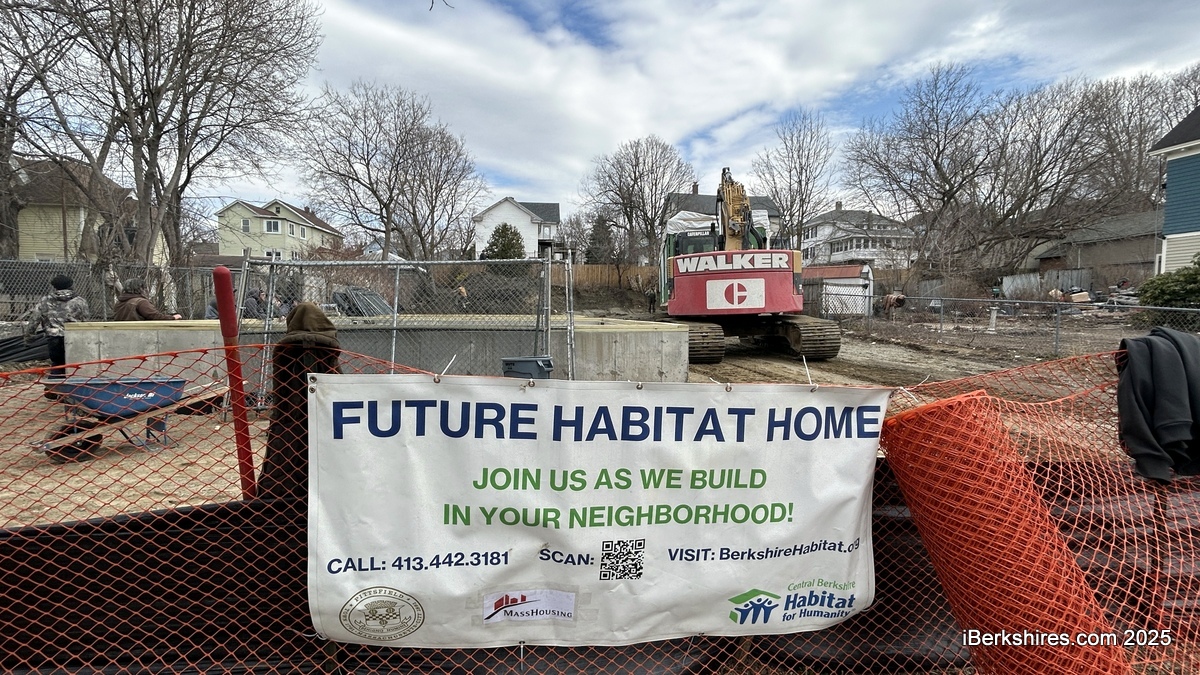PEDA Director Responds to Criticism of Retail Proposal
 PEDA director Corydon Thurston announces a deal to bring a retail center to the William Stanley Business Park in this file photo. The proposal has been met with criticism and concern the park's industrial goals are being compromised. |
Pittsfield Economic Develop Authority Executive Director Corydon Thurston said he's "disappointed" that some are "taking a hard-line, negative positions before the project has even been fully revealed, or brought forward and discussed."
PEDA and Waterstone Retail Development of Needham announced two weeks ago an agreement to create a retail shopping facility on 16 acres of the William Stanley Business Park.
Since the announcement, there has been a barrage of speculation and criticism in comments on iBerkshires and other local media forums, ranging from mild hesitation to extreme accusations. Notable voices such as former New England Newspapers executive Martin Langeveld and former Berkshire Eagle business editor Lewis Cuyler have raised strong objections in letters to their former paper. There's also a petition against the venture being promoted on Facebook by Michael Ward, who is ending his term on the City Council.
Opponents of the plan call it a departure, if not a complete abandonment, of PEDA's established purpose to attract a more industrial and manufacturing base of tenants to this troublesome brownfeld site.
Some have even questioned the legality of the proposed development, saying it violates the very agreement and charter documents under which PEDA was formed.
Specifically, the Definitive Economic Development Agreement contains a list of prohibited uses that include retail shopping, food-based businesses including restaurants, grocery stores or food storage, museums, galleries, and day care or elder care. Under the wording of the DEDA, these prohibited uses may be allowed on the transferred property only if agreed to by all parties.
According to Thurston, the approval process for this exception all took place before the project was even announced. After approval of the use by the PEDA board, G.E. was still required to sign off on this exception. (See Attachment D).
"Yes, it was prohibited as a general use, but that's a very broad category. These agreements were put together back in 1998, before they knew the extent of the pollution, before the buildings were demolished," said Thurston. "A lot of those provisions were written in just as protections, so they had the opportunity to say yea or nea."
"GE is still very concerned, and being conservative, as they were back when the agreements were signed," he said.
The director said that following being first approached by Waterstone, one of the "earliest pieces" was going to GE for approval. "Without the approval of the parties, GE specifically, we wouldn't have been able to go forward with bringing this to table for the city to talk about."
Rather than a fundamental deviation from its goal of attracting industrial clients, Thurston said he sees the proposed Waterstone plan as positive incentive to growing this business corridor.
"We look at other cities and see that new urban revitalization programs always include mixed use. It's a combination of retail, housing, business, R&D, and in some cases manufacturing in clusters. We think there's a wonderful opportunity to have retail attract business into the core of the city, because as that traffic increases, and there's more visibility and activity within that central core, it will create additional investment and additional development. That seems to be the theory that is working in other parts of the country.
"Any viable tenant, whether it's manufacturer, a new financial center, R&D, anybody that wants to invest in Pittsfield I don't want to lose them," he continued. "If we can't put them on the PEDA site, we want to have them somewhere in town. If another GE had walked in the door, I'd have been presenting that as well, but it didn't, and this did."
In the case of Waterstone Development, rather than simply a new tenant like MountainOne Financial or Action Ambulance, the developers of this new project are anticipated to have a more active role in the future development of the rest of the transferred property.
"They have a retail division and an industrial division, and they work hand in hand, and I'm very hopeful that they're going to be able to help us," said Thurston. "Part of the success of their retail center is not just the traffic that's there, but getting this lively. They want to help me make things happen on the life sciences building, they want to help make things happen on the vacant pieces, because that also breeds traffic, and activity and stability and all those things work to improve retail sales. I'm very excited because they have that experience, they have the contacts that will help broaden our marketing efforts, and maybe find one or two of those mysterious companies that are so hard to find in the last decade in the Northeast."
When asked if the resistance from so many parties since the announcement of the Waterstone project would have an adverse affect on it as it faces the city's permitting process in the coming year, Thurston was generally optimistic.
"Certainly it's stimulating discussion already, and that's never a negative thing, because the more people learn about and understand things the more comfortable they'll be," he said. "I hope that a lot of the early negatives are just based on the facts that they don't know what it is, or maybe there's a belief that there's a lot of these manufacturing jobs waiting in the wings.
"We'll have to let it run its course, but it will certainly be well-aired, and after it's thought out I hope people will think this truly is a good thing. I hope we can keep them in the park, and if not, I hope we can keep them in the city."
The 16-acre property in question is expected to finally be transferred to PEDA in mid-January. It is the last of the parcels to be transferred from General Electric ownership. The process of transferring property from GE to PEDA has been ongoing since 2005.
Tags: business park, development, PEDA,
















